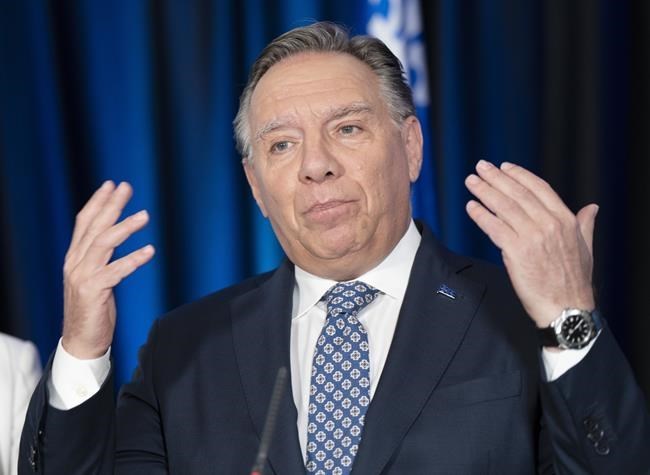QUEBEC — Coalition Avenir Québec Leader François Legault apologized on Tuesday for offending the husband of an Indigenous woman who filmed nurses mocking her as she lay dying in a Quebec hospital.
Legault told reporters he never meant to offend when he said during a televised leaders debate last week that the racism situation at the hospital in Joliette, Que., is "settled."
Looking into the camera during a campaign stop in Orford, Que., in the province's Eastern Townships, Legault directly addressed Carol Dubé, husband of the late Joyce Echaquan, an Atikamekw woman who died in hospital in September 2020.
"I offended you and I sincerely apologize," the incumbent premier said, adding that he wants to meet with Dubé after the election. "I can only imagine how hard it must be, what you went through."
Echaquan, a 37-year-old mother of seven, filmed herself on Facebook Live as a nurse and an orderly were heard making derogatory comments toward her shortly before her death at a hospital northeast of Montreal.
Coroner Géhane Kamel concluded Echaquan's initial diagnosis was based on prejudice and she wasn't properly monitored before finally being transferred to intensive care. Kamel has said Echaquan would likely still be alive if she were a white woman and that systemic racism "undeniably" contributed to her death.
Legault said Tuesday the point he was trying to make during the debate was that significant improvements have been made at the hospital since Echaquan died. The hospital, he added, hired Indigenous liaison workers to improve relations between the Atikamekw community and the health-care system.
In October 2021, Paul-Emile Ottawa, chief of the Atikamekw Council of Manawan, told reporters that members of his community were slowly regaining their trust in Quebec’s health-care system. He said he was “very happy and particularly proud” of the steps taken by the regional health board to improve the situation, adding that more needed to be done.
The incumbent premier said he recognizes Indigenous people in Quebec still face racism. "There are racist people in Quebec, particularly towards Indigenous people. We have to fight that; we can't accept that," Legault said Tuesday.
Dubé and Atikamekw leaders condemned Legault's comments in the days following the debate; however, Legault said it was only after reading an interview with Dubé in a Montreal newspaper Tuesday morning that he realized he had offended Echaquan's husband.
In a letter made public through his lawyer on Friday evening, Dubé wrote that the changes at the hospital have been largely cosmetic and that deeper systemic issues have not been addressed.
On Saturday, Legault accused members of the Atikamekw community of wanting to reopen a debate on systemic racism — which he denies exists in Quebec's institutions — rather than solve problems at the hospital.
"So they want to have a debate about words rather than ensuring that we fix the problems on the ground," Legault told reporters.
Legault on Tuesday did not address his comments from the weekend.
This report by The Canadian Press was first published Sept. 20, 2022.
Jacob Serebrin, The Canadian Press



